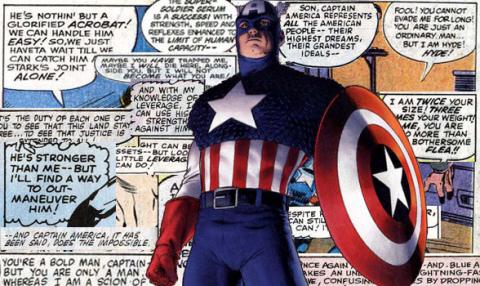Why Captain America Is Important

As of this writing, actual fascism is having quite a resurgence in the United States, and as expected, it’s wrapped in the flag and carrying a cross. In these times, many people are turning to one of our great anti-fascist symbols: Captain America.
He’s having a resurgence in prominence lately as well, thanks to his superb portrayal by Chris Evans in some wildly popular films. I find that oddly validating, as I was a Captain America fan when it was actively uncool. Back when comic books were for losers, and even the other losers looked down on Cap, preferring the adventures of the Punisher and Youngblood. I still have the 50th anniversary issue, from the now-quaint-sounding year of 1991. (Mark Gruenwald on script, Ron Lim on artwork.) I mention this because it’s fair to say I’m more familiar with the character and his history than most people, so when I say he’s absolutely the right hero for our times, I know what I’m talking about.
Comics continuity is tangled and contradictory, so for clarity I’ll specify that I’m referring here to Steve Rogers rather than any of the others who’ve taken on the role. And Steve Rogers is the Captain America we need to believe in as we face a very dark time for our nation, because he has no superpowers.
This is a somewhat contentious point: a few comics seem to contradict it, mostly by writers not familiar with the character. A vague impression that Captain America has superhuman strength or speed is widely held. However, most of the comics hew to the classic line: the super-soldier serum gave Steve Rogers peak human physical abilities. He is as strong, fast, and agile as a man can possibly be, the limit of human potential. A common theme in the comics is Cap having to fight an opponent who has superpowers, but overcoming them anyway. Villains are always saying “Captain America? He’s just an ordinary man, how could he possibly stop us?” and then learning that question isn’t rhetorical.
Then there’s the issue of symbolism. Cap represents the American Dream, our highest ideals, the best of what we can be as a nation. He embodies the freedom and opportunity and justice that the country itself falls short of, but that at our best we strive toward. This means he’s always been a political figure; his very first issue famously drew controversy with a cover showing him punching Adolf Hitler in the face, almost a year before America entered WWII. The “America First” crowd was sending Jack Kirby some pretty ugly threats over that, you can believe.
Since then, most of his best storylines have been about how his ideals conflict with the troubled, compromised America around him, often in unexpected ways. After his Watergate-metaphor story in the early 70s (the president turned out to be an actual supervillain), he found his faith in America shaken, as did many people. In the 80s, he gave up his identity rather than be a government tool, and was replaced with a Reaganite superpatriot who, it turned out, wasn’t up to the job. He’s frequently been turned into a Nazi, via the usual time-travel and mind-control shenanigans, but the strength of his ideals always wins out in the end.
He always wins, and that’s important too. No matter how outnumbered or outmatched he is, no matter how hopeless it looks, he finds a way to triumph over impossible odds. Without superpowers.
I harp on the lack of superpowers because that symbolism matters even more. Peak human potential means that he doesn’t just represent the best our nation can aspire to, he represents the best each of us can be. The potential to be Captain America is inside each of us, as memorably phrased in what may be my favorite line about him:
"...people could do a lot of stuff he does. If we cared as much. And tried as hard."
That’s why he’s the hero we need as we confront dark times. Captain America is a statement of faith that what is best in us, and what is best in our country, will ultimately win. We need that faith because without it, we have no chance of making it true. We can defeat the forces that threaten our country, if we can find our inner Steve Rogers. If we care as much. And if we try as hard.